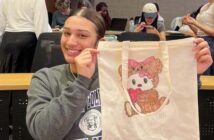On March 24, as part of Wellness Week programming, a webinar was hosted as a platform to confront how mediated trauma has become a stressor in many lives.
The event, called “Living in Times of Trauma,” offered a space to have open discussions about implicit biases, stereotyping, and mental health issues related to mediated trauma, particularly related to Black Americans.
Danielle Kilgo, Ph.D., a professor of journalism, diversity and equality in the Hubbard School at the University of Minnesota, presented on stereotypes created by the media’s portrayals of Black Americans.
Kilgo highlighted how she believies the mediated world is defined by people sharing triggering images and videos of racial injustices without thinking about the content being shared, and how Black Americans experience trauma from watching the depictions.
In reference to the video of George Floyd being murdered, Kilgo said it caused immense feelings of tension.
“I knew that what followed at the end of that video is the same feeling I get when someone close to me dies…It’s the same nauseating tension that makes it hard to breathe when you’re in grief…Feeling the same pain over and over again and that pain is watching people who look like me die,” Kilgo said.
In a society centered around social media, Kilgo responded to the question of how people should spread awareness for racial injustice without putting out triggering content that can cause further stress.
She said sharing things without being invested in following up becomes sensationalized and performative.
“If you’re going to cover it and include this narrative that can be so traumatizing, remember you have to follow up because there’s so much more to the story,” Kilgo said.
Kilgo also spoke to the topic of ingrained stereotypes turning Black people into targets.
The stereotype of gang’s being a group of Black people is reinforced when victims of police brutality, Michael Brown and Tamir Rice, are depicted by bad quality images, Kilgo said.
Kilgo said the victims were seemingly “big for their age,” instead of being depicted as the innocent kids they were.
Kareem Johnson, Ph.D., associate professor of instruction in psychology at Temple University, said racism is a unique form of stress. Seeing and experiencng repeated discrimination can cause a plethora of health issues, he said.
“Race is a stigma. A stigma is when we have a devalued identity… This really gets emphasized when police officers kill Black people but don’t suffer any punishment,” Johnson said. “The conclusion is that a Black life is worth less than other lives.”
Johnson urged attendees to go forward with the understanding that measures should be taken to combat the injustice, such as police training reform, and said having more one-on-one interacial interactions is necessary to combat society’s “us versus them” mentality.
Johnson said we need more humanity in these interactions.
“What we need is to get to know each other on a personal basis. It becomes easier to see Tamir Rice as a child, it becomes easier to see a Black person as a person first,” Johnson said.
Panelist Stephanie Schiffler, Ph.D., a postdoctoral resident at Lehigh’s counseling center, presented on the importance of caring for oneself in challenging times.
“A lot of the work of taking care of ourselves comes from trying to reclaim a sense of safety,” Schiffler said.
Schiffler emphasized the importance of checking in with oneself daily, as times today are defined by news outlets exposing traumatic events to society.
The event was mediated by journalism professors Jennifer Midberry and Mariana de Maio, and journalism and Africana studies professor John Vilanova. The webinar was sponsored by the Department of Journalism and Communication, the Office of Diversity, Inclusion and Equity, and the Africana Studies Department.






Comment policy
Comments posted to The Brown and White website are reviewed by a moderator before being approved. Incendiary speech or harassing language, including comments targeted at individuals, may be deemed unacceptable and not published. Spam and other soliciting will also be declined.
The Brown and White also reserves the right to not publish entirely anonymous comments.
1 Comment
No comment.